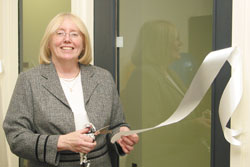Students, employers and university work together for co-op success

Christine Webb, Director of the Institute for Co-operative Education, officially opened their new digs on the third floor of the BE building on Feb. 15.
Marion Elissalde
Although the offices have just changed, Concordia’s Institute for Co-operative Education has been around for 25 years.
At a ribbon-cutting ceremony last week, guests could explore the new space on the third floor of the BE building, on Guy just below Ste. Catherine St. The co-op now has more space, and more windows.
“I’m so glad to see students, employers and faculty, the three sides of this fantastic triangle,” said Institute Director Christine Webb.
The program has been around long enough that former co-op students are now hiring current ones.
“At Alcan, we’ve even had a situation where a former student hired a student who went on to work at the company and hire another co-op student,” said Louise Lalonde, Co-op Program Coordinator.
Co-op students alternate academic terms with work terms in relevant businesses, industries or services. Over the course of a degree, they gain about one full year of experience that is directly related to their area of study.
Audrey Sylvain, a marketing student, has completed three of four work terms. She said the co-op program appealed to her because “it allows me to look at different ways I can use my degree before I graduate.”
Her first placement at a not-for-profit was a completely different experience from her second at an insurance company and her third placement at Concordia. “It helps you find out what you like, what you don’t like, what your strengths are, and what you need to improve.”
Co-operative education is a collaborative partnership between the university, the employer and the student. “Our success is 99 per cent based on building these relationships,” explained Webb. “There are employer reps who change companies, and the first thing they do at the new firm is call us.”
At Concordia, co-op is an option in nearly 30 undergraduate programs and a handful of graduate programs. Expansion to the graduate level was implemented over the last five years in response to demand from industry. About 1,000 students over the university’s four faculties avail themselves of the Institute and its services.
“There is great value added for the students,” Lalonde said. The Institute provides courses and training sessions for students so they not only graduate with experience, but also with well-developed job search and interviewing skills.
She pointed out that some students require more support than others. “Sometimes you think, “Oh, my goodness, this one really needs help!’ but these students are usually our most exciting successes.”
The co-operative education movement is now 100 years old. It was started in 1906 by Herman Schneider, an engineering professor at the University of Cincinnati, who decided his students were graduating without a real appreciation for the practical application of their studies.
Today, more than 75,000 students participate in co-op programs in over 80 Canadian postsecondary institutions.
For more information about the Institute for Co-operative Education visit the web site at www.co-op.concordia.ca
With files from Karen Herland